The Startup World Needs More Women-Led Unicorns

Unicorns: they exist. In the startup world, at least.
Unicorns are privately held companies valued over $1 billion. The name alludes to the statistical rarity of such successful ventures: in 2017, CB Insights tallied the odds of becoming a unicorn at less than 1 percent.
Even more rare: finding women at the helm of these billion dollar companies. That’s the problem the startup world needs to fix, said Michelle Abbs, director of the Miami Women Innovating Now (WIN) Lab®, a venture accelerator designed specifically for women entrepreneurs.
“We are leaving billions of dollars on the table by not having half of the population involved in the entrepreneurial ecosystem,” said Abbs. “It’s not a feminist problem. It’s a problem we all have to solve.”
How do we raise the number of women-led unicorn successes? Abbs teamed up with Amanda Elam, research director for Babson College’s Center for Women’s Entrepreneurial Leadership, and Ana Paula González, head of 500 Startups Miami, to discuss the issue. In a panel called “The Future is Female (And The Next Unicorn Is, Too)” at the 2018 eMerge Americas Conference in Miami, the experts offered insight into the problem—and how we can fix it.
Overcome (and Eliminate) Implicit Bias
In 2017, only 2 percent of venture capital funding went to female founders. Why might that be?
One problem: implicit bias, attitudes or stereotypes that affect our understanding, actions, and decisions in an unconscious manner. Think of it as a cognitive shortcut; preferences or aversions that live in your subconscious and affect decision making.
“A lot of the discretion exercised in venture capital comes down to gut feelings,” said Elam. “Investors are trying to wade past the pitch and figure out if it’s the right opportunity, right team. A lot of how that discretion plays out works against women.”
One example: The perception of children’s impact on a woman’s ability to lead. “If a woman is pregnant, or has a child at home, there’s a probability instinct that might say, ‘She might not be the best leader. She won’t have a ton of time for this,’” said Elam.
Using an expressive tone and a high pitch also might work against women when pitching, said Abbs. “That’s not going to instill confidence in investors, and that’s implicit bias.”
Disregard Gender Stereotypes
“We hear these stereotypes that say women are crappy at business. It’s just not true,” said Elam. “Research over the last 30 years have shown that women are just as, if not more, talented as men in management. If we have more women leading big companies, we can directly challenge these stereotypes.”
In a study led by Lakshmi Balachandra, assistant professor at Babson College, researchers studied videos from a pitch competition to test the perception that VCs are biased against female entrepreneurs. The analysis revealed that people with a high degree of stereotypically female behavior (warmth, sensitivity, expressiveness, and emotionality) were less likely than others to succeed at pitching.
“Some of the amazing women in our Miami WIN Lab have shy personalities,” said Abbs. “That doesn’t mean they are going to be any less successful.”
“Own the fact that women are damn good at business,” advised Elam. “Tell every single person you know that it’s true.”
Build a Pipeline
How can we continue to battle implicit bias and stereotypes? Having more women at the table: only 7 percent of partners at top venture capital firms are women.
“As women advance in business, they become investors themselves,” said Elam. “Look beyond gender—they look for leadership skills, good market opportunities. They want to make good investments. We need more women who have scaled the heights, and can mentor others on how to do it.”
That’s why programs such as 500 Startups Miami and the Miami Win Lab exist. At 500 Startups, the mission is to discover and back the world’s most talented entrepreneurs, help create successful companies at scale and build thriving global ecosystems. Gender diversity is baked into its DNA.
“We’re looking to elevate, celebrate, and prepare the hidden jewels, to help them scale in a successful way,” said Gonzalez. “We’re trying to understand every step of the process that gets a women into our portfolio and eventually scale.”
With the WIN Lab, Abbs and team provide women entrepreneurs with an inspiring community and a rigorous, experiential process that catalyzes innovative thinking and enables them to successfully launch or transform businesses. The hope: entrepreneurs emerge from the WIN Lab ready to apply for programs like 500 Startups, or to take the next step toward moving a career or a business idea forward in programs like Babson College’s Blended Learning MBA.
Posted in Community



